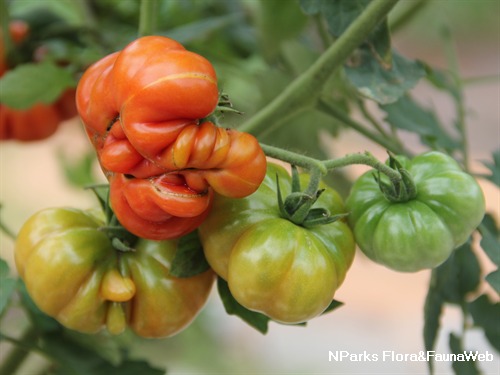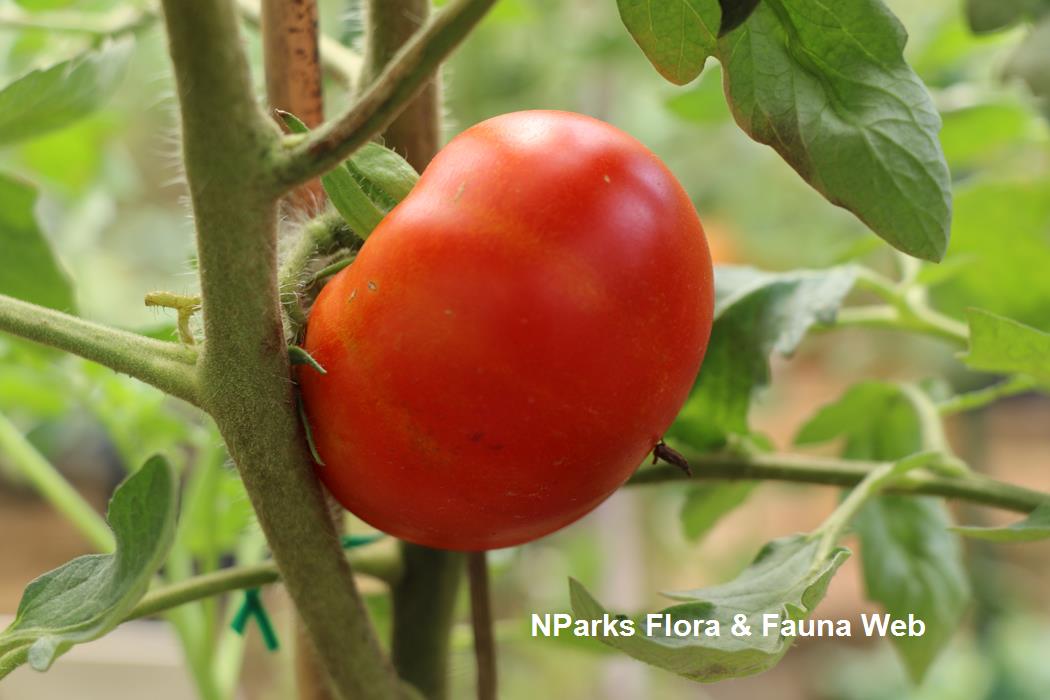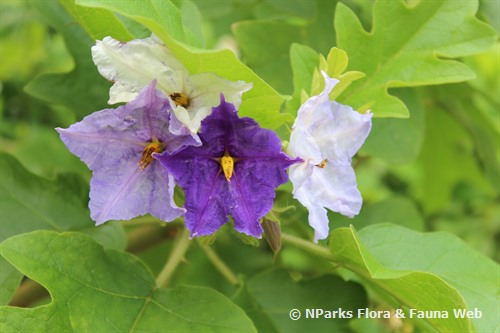
Back
Solanum lycopersicum 'Bali'
| Family Name: | Solanaceae |
| Common Name: | Bali Tomato |
This Indonesian tomato cultivar produces an abundance of ribbed, oval fruit.
Name
Classifications and Characteristics
| Plant Division | Angiosperms (Flowering Seed Plants) (Dicotyledon) |
|---|---|
| Plant Growth Form | Herbaceous Plant |
| Lifespan (in Singapore) | Annual |
| Mode of Nutrition | Autotrophic |
| Maximum Height | 1 m to 1.5 m |
Biogeography
| Native Distribution | Of horticultural origin |
|---|---|
| Local Conservation Status | Non-native (Horticultural / Cultivated Only) |
Description and Ethnobotany
| Growth Form | Herbaceous plant up to 1.5 m tall. |
|---|---|
| Foliage | Compound leaves are spirally arranged around the stem with one leaf attached to the stem and adjacent leaves oriented at regular angles. |
| Flowers | Yellow, star-shaped flowers are held in a cluster inflorescence. |
| Fruit | Ribbed, oval fruit is deep red at maturity and 5-8 cm wide. It has a pleasant, acidic flavour. |
| Cultivation | Remove some of the axillary shoots (the immature bud-like growths that form between the stem and leaf stalk) to encourage the plant to invest more resources in fruit rather than foliage and allow the main branch supporting the fruit to become stronger. |
| Ethnobotanical Uses | Edible Plant Parts : Edible Fruits Food (Fruit or Vegetable): The beefsteak tomatoes are an excellent addition to salads. |
Fauna, Pollination and Dispersal
| Pollination Method(s) | Abiotic (Wind), Biotic (Fauna) (Insects (Bee)) |
|---|
Plant Care and Propagation
| Light Preference | Full Sun |
|---|---|
| Water Preference | Lots of Water, Moderate Water |
| Plant Growth Rate | Fast |
| Potential Problems | Check the underside of leaves regularly for aphids, whiteflies and red spider mites. Avoid over-fertilising which encourages aphids to attack. Adult whiteflies can be trapped by hanging yellow sticky traps. Control red spider mites by applying organic soap or mineral oil to the leaves. Check the soil for root-knot nematodes and use crop rotation with resistant varieties or non-host plants to control them. |
| Pest(s) | Sucking Insects, Nematodes |
Foliar
| Mature Foliage Colour(s) | Green |
|---|---|
| Foliar Type | Compound (Odd-Pinnate) |
| Foliar Arrangement Along Stem | Spiral |
Floral (Angiosperm)
| Flower & Plant Sexuality | Bisexual Flowers |
| Flower Colour(s) | Yellow / Golden |
|---|---|
| Flower Grouping | Cluster / Inflorescence |
| Flower Symmetry | Radial |
| Individual Flower Shape | Stellate / Star-shaped |
Fruit, Seed and Spore
| Mature Fruit Colour(s) | Red |
|---|---|
| Mature Fruit Texture(s) | Bumpy / Tuberculate, Waxy, Glossy / Shiny |
| Fruit Classification | Simple Fruit |
| Fruit Type | |
| Mature Seed Colour(s) | White |
Image Repository
Others
| Master ID | 32739 |
|---|---|
| Species ID | 7151 |
| Flora Disclaimer | The information in this website has been compiled from reliable sources, such as reference works on medicinal plants. It is not a substitute for medical advice or treatment and NParks does not purport to provide any medical advice. Readers should always consult his/her physician before using or consuming a plant for medicinal purposes. |








